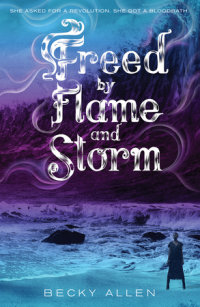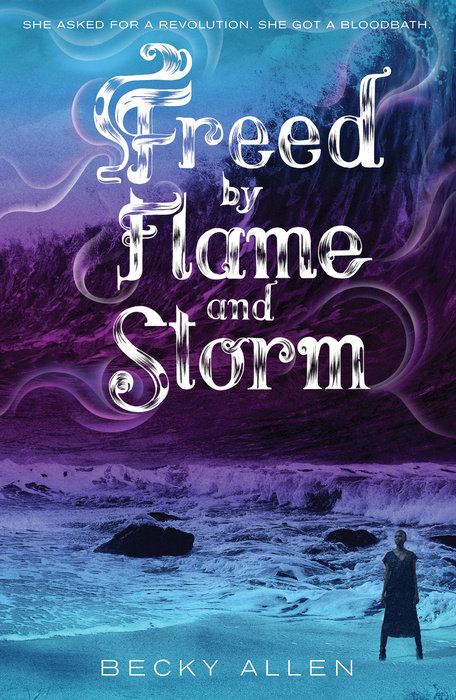Freed by Flame and Storm
For fans of Tamora Pierce and Kristin Cashore comes the exciting and thoughtful social-justice fantasy sequel to Bound by Blood and Sand.
Revolution is nigh, and one seventeen-year-old girl stands at the head of it all.
Jae used to be a slave, laboring with the rest of her people under a curse that forced her to obey any order she was given. At seventeen, she found the source of her people's lost magic and became the only person to break free--ever. Now she wants to use her power to free the rest of her people, but the ruling class will do anything to stop her.
Jae knows that breaking the curse on her people would cause widespread chaos, even unimaginable violence between the castes, and her caste would likely see the worst of it. Many would die. But to let them remain shackled is to doom them to continue living without free will.
How is one girl, raised a slave and never taught to wield power, supposed to decide the fate of a nation?
"Much food for thought and discussion; but above all, a gripping read." —Kirkus Reviews
"Unflinchingly honest...A satisfying sequel." —SLJ
"The action of this memorable story is fast and furious, its challenges many, and the fight for right ever-present." —Booklist
“Allen does a great job of interweaving elements of the backstory throughout...will appeal to readers looking for stories about social justice.” —VOYA
An Excerpt fromFreed by Flame and Storm
Chapter 1
Erra stepped into the small meeting chamber with her mind already racing. The room was lantern-lit, with latticework over the flames casting strange shadows and making the faces of the four Highest look even more serious. She took a breath and tried to match them, grim for grim, and waited to be told what this was about. Two other Highest heirs had already been in, one at a time, and then dismissed just as quickly. Their expressions had betrayed nothing but bafflement, given no sign at all of why they’d been called here, in front of their parents, or what had happened inside.
Now it was her turn.
The four current Highest were waiting for her, seated on cushions around the low table. Her father, Elthis Danardae, was among them. He wore the same dead-eyed expression he’d had since returning home from one of their remote estates weeks ago with the news that her younger brother, Elan, had died. He hadn’t spoken about it much, but she’d learned from others that Elan had had an affair with the lady of the estate, even after Elthis had forbidden it, and the two of them had fled into the desert together. There had been an enormous sandstorm, and there was no way anyone could have survived it.
Elthis hadn’t mourned outwardly, given Elan’s history of defiance, so Erra hadn’t been allowed to, either. But the other three members of the Highest had been celebratory—not over Elan’s death, but over the rain that had coincided with Elthis’s return, ending the drought that had stretched on for years. As the reservoirs overflowed and people danced in the streets, only the Danardaes hadn’t celebrated. Now, though, the other three Highest’s faces were just as serious as her father’s.
“Don’t sit,” said Gesra Caenn, the oldest of the four. So Erra didn’t, just waited, as Gesra nodded at Tarrir Pallara.
Tarrir stood and made his way to the small fireplace at the back of the room. A flame was burning, but it was so low it was barely more than embers, a soft glow in the small room. “Come here.”
Erra stepped forward. All four of them watched her—her father, Gesra, Tarrir, and Callad Kavann, the fourth member of the Highest. It was Callad’s heir who’d been in here last, though he wouldn’t have that title officially until he took his vows in a matter of only a couple of weeks.
Tarrir reached for the handle of a fire iron, which had been left with its tip pressed into the coals, but as he lifted it out, Erra realized it wasn’t a fire iron. It was a brand, one she’d seen plenty of times before. The heated end was shaped into a circle, cut into quarters. Every member of the Highest and the Avowed who followed them had had it pressed to their skin when they’d said their vows—Erra included.
“Take this,” Tarrir said, shifting to give her the handle. “And shut your eyes.”
Baffled, Erra did as he said. He released it into her hand and she tightened her grip and closed her eyes.
“What do you see?” Gesra asked.
“What?” Erra said, but before anyone could answer, she saw. Flames appeared behind her eyelids, as if she were staring into an endless fire that flickered and changed colors. The flames were green one moment, then purple and blue, throwing up sparks that seemed to envelop her. The scent of smoke and blood seeped into the world around her, so thick she had to cough, her eyes flying open.
The vision faded, the smell with it. Everything was exactly as it had been, the four Highest watching her expectantly. Gesra even had a smile on her lined face, a sight Erra had almost never witnessed before.
“Flames,” Erra said, staring around wildly. “I saw flames.”
“Good. That’s what I see, too. Put that back, and have a seat,” Gesra said.
Erra did as she was told, her hand trembling, the choking feeling of the smoke still in her throat. She folded down onto the cushion between her father and Lady Callad and tried to catch her breath. Callad gave her an approving nod, but her father’s expression was blank. It was as if it had gotten stuck that way. He’d rarely smiled or laughed to begin with, but he’d done neither at all since he’d come home without Elan.
Finally, when no one said anything, Erra said, “I don’t understand what just happened.”
“It’s . . . hard to explain,” Tarrir said. “And we normally wouldn’t tell you any of it until you were ready to inherit, but our hands have been forced.” He paused, glancing at Elthis, who only looked back, wordless and expressionless.
“Is this somehow about Elan?” Erra guessed.
Tarrir nodded. “Your brother broke his vows—a fact that we’ve gone to great pains to conceal. The world doesn’t need to know that one of our own betrayed us.”
“He . . . Elan . . .” Erra couldn’t even form the question. But . . . “He’s alive?”
“He did something none of us would have thought possible,” Tarrir said, not quite answering her question. “He awoke magic—real magic, the kind they used in the War. But it’s not in his control. The mage is a slave girl. We think the two of them together ended the drought.”
“But that’s good,” Erra said, struggling to understand. The drought had been growing worse for years; even though the mighty Well that sustained their world was fueled by magic, it hadn’t been able to fight the depth of this drought. The rain, when it came, had been desperately needed. “If Elan did that and survived, then he’s a hero. And a Closest slave with magic? We can do great things with her.”
“No,” Gesra said, voice sharp. “There’s no way to control her. Because the girl—the Closest girl—she used the magic to free herself. Not one of us has power over her or her magic. Think of the disaster she could bring if she strikes against us.”
Oh.
Erra reeled, the implications of that almost too much to take in. The Closest were their slaves, held in bondage by a generations-old Curse that forced them to obey any order they were given. If one of the Closest had escaped the Curse, and had real magic, magic strong enough to end a drought . . .
“She can’t be allowed to live,” Elthis said, finally speaking. “Elan may be alive, but she took him from us. And she’ll take more.”
Erra sucked in a breath, trying to hold herself steady under the deluge of information. Elan might be alive. She wanted to sag with relief but didn’t dare show so much emotion in front of the Highest. They’d see it as a weakness, but her brother might be alive.
But if he lived, he’d committed a crime that couldn’t be allowed to stand. The last time Closest had freedom and magic, they’d nearly destroyed the world with it—and they’d nearly succeeded in seizing control of the Well. The Highest had vowed to do anything, including give their lives, if needed, to keep the world at peace. Loyalty to a brother or a son was nothing compared to those vows. If Elan lived, he was a vow-breaker.
“I don’t understand,” Erra said again. Her brother was so good-natured, eternally smiling, always eager to do his duty. He was occasionally foolish, but he was never malicious. She couldn’t imagine him breaking his vows.
“We can stop this mage—and Elan, if he lives. We have to,” Gesra said. “And we need you to do it.”
“Me?” Erra asked. She looked around the room, her gaze finally settling on her father. For just a moment, she thought she could make out a hint of sorrow in his expression, but then he blinked and it was gone.
Maybe Erra could find and reach out to Elan. The Highest all knew she’d practically raised him. No matter what had happened during his banishment, if she could find Elan, she could make him listen to her, and if he’d broken his vows, she’d find a way to make it right. But instead of suggesting that, Gesra continued, “There’s much to explain. And it begins with the brand.”

